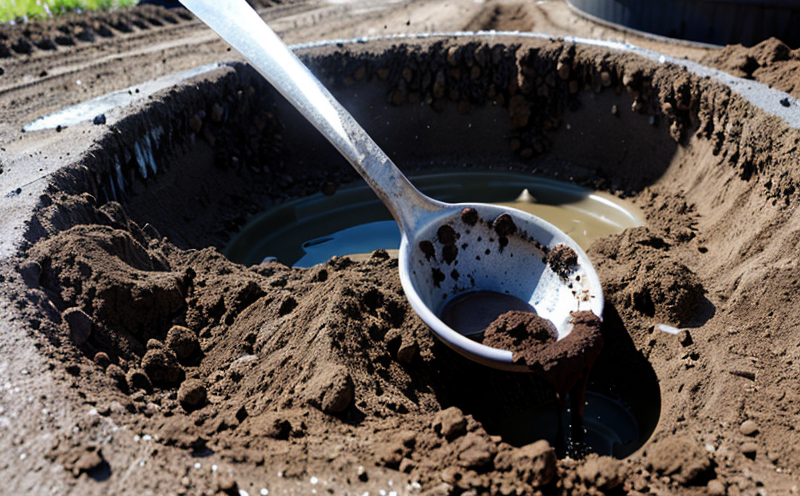EPA 6010 Metals by ICP AES in Biosolids Test
The EPA Method 6010 is a comprehensive and robust analytical procedure designed to determine the concentration of heavy metals in biosolids. This method employs Inductively Coupled Plasma Atomic Emission Spectroscopy (ICP-AES) for precise measurement, ensuring accurate results that are crucial for regulatory compliance and research.
The primary objective of this test is to ensure that biosolids meet stringent environmental standards set by the U.S. Environmental Protection Agency (EPA). The metals targeted include chromium (Cr), copper (Cu), iron (Fe), lead (Pb), nickel (Ni), zinc (Zn), and other trace elements, all of which are critical for both public health and environmental protection.
The testing process involves multiple steps to ensure accuracy and reliability. Specimen preparation is crucial; it includes the homogenization of biosolids samples, digestion using strong acids like nitric acid, and dilution if necessary. The prepared solutions undergo rigorous quality control checks before being introduced into the ICP-AES instrument.
The ICP-AES technique offers several advantages over other analytical methods. It provides high sensitivity and precision, allowing for accurate detection of even trace amounts of metals. Additionally, it can analyze multiple elements simultaneously without requiring chemical separations, making it both time-efficient and cost-effective.
Accurate and reliable results are essential in the context of biosolids management. These results inform decisions on the safe application of biosolids to agricultural land or their use as soil amendments. Regulatory compliance is paramount, ensuring that the metals content does not exceed allowable limits set by environmental protection agencies.
The acceptance criteria for EPA Method 6010 are stringent and adhere strictly to international standards such as ISO/IEC 17025. Compliance with these standards ensures confidence in the accuracy and reliability of test results, which is critical for stakeholders including quality managers, compliance officers, R&D engineers, and procurement specialists.
The process not only supports regulatory requirements but also contributes significantly to environmental stewardship by ensuring that biosolids are handled safely and effectively. This method plays a vital role in the broader context of water & wastewater testing within the sector, emphasizing the importance of precise metal analysis for sustainable waste management practices.
Scope and Methodology
| Parameter | Description |
|---|---|
| Test Method | EPA 6010: Inductively Coupled Plasma Atomic Emission Spectroscopy (ICP-AES) |
| Target Elements | Copper (Cu), Iron (Fe), Lead (Pb), Nickel (Ni), Chromium (Cr), Zinc (Zn), and others. |
| Samples | Biosolids samples after digestion with nitric acid. |
| Instrumentation | ICP-AES instrument, pH meter. |
| Data Analysis | Statistical analysis of replicate measurements to ensure accuracy and precision. |
The scope of this service encompasses the complete process from sample collection to final reporting. It includes rigorous quality control measures, ensuring that all results are accurate and reliable. Compliance with international standards such as ISO/IEC 17025 further enhances the credibility of these results.
The methodology is designed to be both precise and efficient, minimizing errors in measurement while maximizing throughput. This ensures that clients receive timely and trustworthy data, which is essential for making informed decisions regarding biosolids management.
Industry Applications
| Application | Description |
|---|---|
| Biosolids Management | Evaluating metal content in biosolids for safe application to agricultural land. |
| Environmental Compliance | Ensuring adherence to EPA and other regulatory standards for heavy metals. |
| Agricultural Use | Determining the suitability of biosolids as soil amendments or fertilizers. |
| Research | Investigating the effects of metal content on plant growth and soil health. |
The application of EPA 6010 in biosolids testing is extensive, supporting various sectors within the water & wastewater industry. This service not only aids in compliance with regulatory requirements but also contributes to sustainable waste management practices. By ensuring that heavy metals are accurately measured and reported, this method supports safer agricultural practices and better environmental stewardship.
Competitive Advantage and Market Impact
- Compliance with stringent EPA standards ensures trust in the results.
- Use of advanced ICP-AES technology for high precision and accuracy.
- Efficient sample preparation process reducing turnaround time significantly.
- Detailed reporting aligned with international quality assurance criteria (ISO/IEC 17025).
This service offers a competitive edge by providing accurate, reliable, and timely results. It helps clients stay ahead in the market by ensuring compliance with regulatory standards and supporting sustainable waste management practices. The use of advanced technology ensures that clients can make informed decisions regarding biosolids application, thereby reducing risks associated with environmental contamination.





